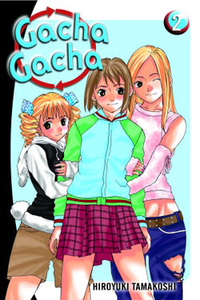Review
by Carlo Santos,Gacha Gacha
G.novel 2
| Synopsis: |  |
||
Kouhei has recently learned that his crush, Kurara, has developed a split personality that makes her behave inappropriately. While trying to hide Kurara's erotic mood swings from everyone else, Kouhei suddenly encounters another split personality who claims to be fourteen years old and curious about sex. When Kouhei demands an explanation, Kurara tells him that the multiple personalities are the result of an accident while testing a new virtual reality game. The characters from the game have entered her mind, and with the risk of new personalities popping up, Kouhei will have to keep Kurara's problem a secret. His life may be in danger, however, when another new personality turns out to be a bloodthirsty fighter. |
|||
| Review: | |||
In theory, Gacha Gacha is a clever little variation on the harem formula: instead of throwing lots of girls at a hapless male protagonist, give him one girl and make her the vehicle for all other romantic possibilities. Sounds cute—in theory. Putting the idea into practice, however, accomplishes nothing new, especially if half the personalities so far are just sexpots-in-training. The premise might have some comedic appeal if the results weren't so predictable and crass. Alas, this volume proves that Gacha Gacha still has a long way to go. Story-wise, Volume 2 accomplishes what Volume 1 didn't: it actually explains what on earth is going on. If you somehow managed to survive the aimless fanservice of the first installment, then this one explains the origins of Kurara's affliction (with a subtle nod to Pokémon to boot). Whether or not you're willing to believe the idea of video game characters taking over your brain, well... that's another issue. It wouldn't be the first time that a shounen romantic comedy got invaded by fantastical concepts—after all, where would the genre be without goddesses, ESPers and aliens—but seeing it enter the story at this stage feels more like a haphazard cover-up than a proper part of the plot. The story later settles into more comfortable territory with that time-honored scenario of teen comedy: the school play. It's an honest attempt to develop Kouhei and Kurara's relationship, but apart from a couple of cute moments, it's just an extension of earlier comedy situations. Not that it really deserves to be called comedy—most of it is just embarrassment. If alternate personality Arisa constantly flashing her breasts and panties isn't bad enough, the introduction of Alice ramps up the lolicon factor with catch phrases like "I'm developing so fast!" (often said as her chest pops out of her outfit). Rin, the fighter, is less nauseating, but if these are the kinds of characters that occupy a virtual reality game, would you want to play it? One look at the artwork, however, and the reason for this flimsy plot becomes clear. Hiroyuki Tamakoshi likes drawing girls half-dressed, he's fairly good at it, and in Gacha Gacha the art takes precedence over story. Tamakoshi's cleverest move is in altering Kurara's character design to indicate each personality—a slight hairstyle change, a new look in her eyes, but still the same Kurara. In fact, the characters are always easy to tell apart, whether male or female; that along with sensible paneling gives the manga a good visual flow. The scenery, whenever it shows up, is drawn with convincing detail, but it's more common to see tones and textures as a shortcut for backgrounds. Where the art really shines, of course, is in the fanservice, which strikes a balance between detail and simplicity to depict the idealized female form. Del Rey's adaptation of the volume is top-notch, with sharp print quality, well-written dialogue, and useful translation notes. Sound effects are left in Japanese while small translations are written alongside them; these translations are often positioned to match the nature of the sound effect, but could use some emphasis with more varied fonts. Dark inks, a high printing resolution and quality paper allow readers to enjoy Tamakoshi's art in all its cheesecake glory. So it looks like that "clever little variation" on the harem formula isn't so clever after all, no matter how sexy it looks on the page. The problem is that instead of focusing on the unique nature of Kurara's multiple personalities, Gacha Gacha recycles old romantic comedy situations just so that Kurara (or rather, her alter ego) can find another excuse to lose her clothes. Unless the story improves dramatically, the only real reason to keep reading is to find out what personalities will surface next. There is one consolation, however: if Kurara keeps using up the annoying ones, she'll get to the likeable personalities eventually, right? |
|
The views and opinions expressed in this article are solely those of the author(s) and do not necessarily represent the views of Anime News Network, its employees, owners, or sponsors.
|
| Grade: | |||
Overall : C-
Story : D
Art : B+
+ Actually explains what's going on. |
|||
| Production Info: | ||
|
Full encyclopedia details about Release information about |
||